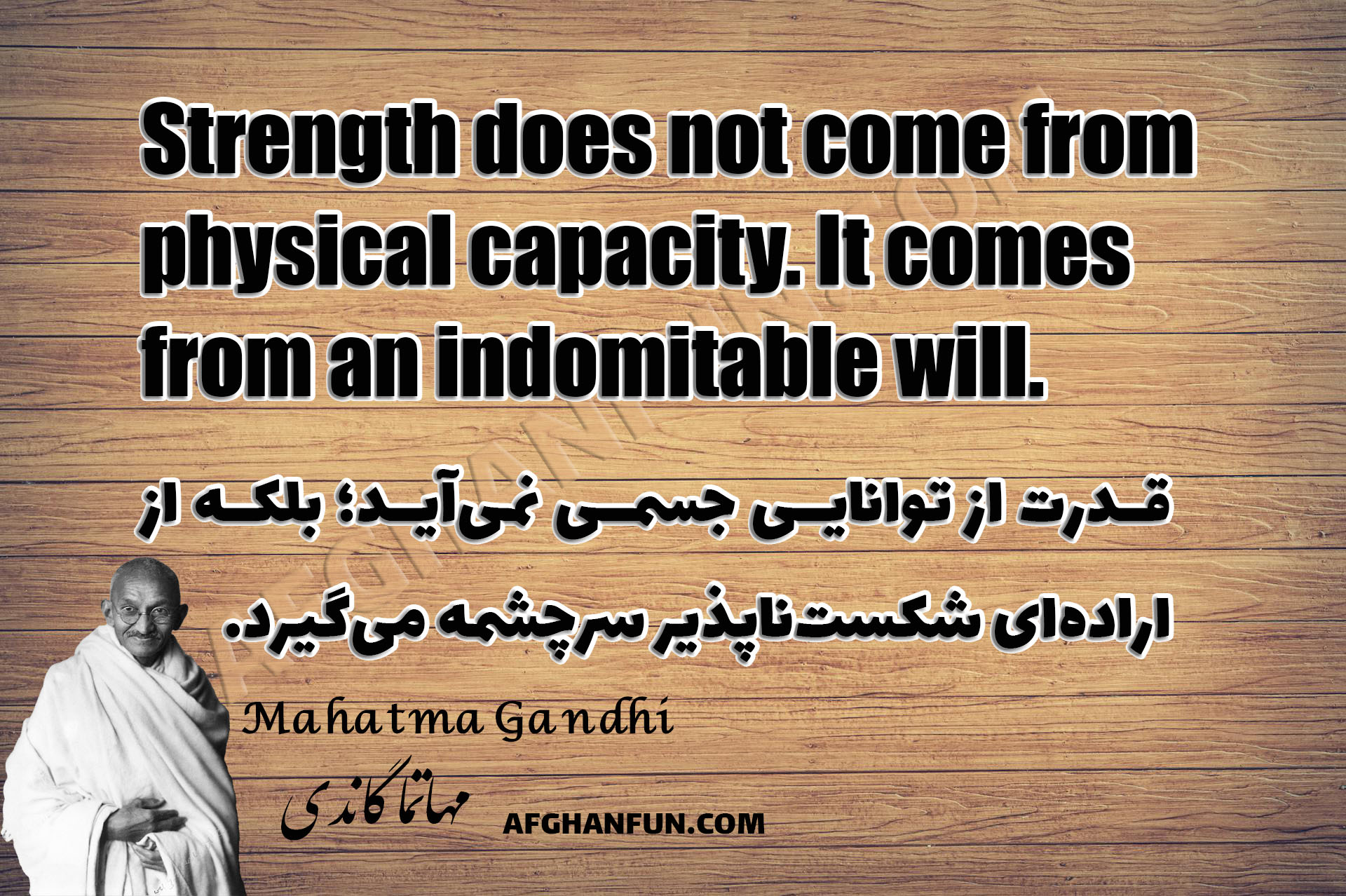The Real Source of Strength: Gandhi’s Philosophy on Willpower
Strength does not come from physical capacity. It comes from an indomitable will.
Mahatma Gandhi
قدرت از توانایی جسمی نمیآید؛ بلکه از ارادهای شکستناپذیر سرچشمه میگیرد.
مهاتما گاندی
این نقل قول از گاندی نشان میدهد که قدرت واقعی درونی است و به اراده و عزم انسان وابسته است، نه به نیروی فیزیکی یا تواناییهای ظاهری. حتی اگر کسی از نظر جسمی قوی نباشد، با ارادهای محکم و روحیهای قوی میتواند بر چالشها غلبه کند و به اهداف خود برسد. این پیام اهمیت قدرت ذهنی و اراده را برجسته میکند.
Қувват аз тавоноии ҷисмонӣ намеояд, балки аз иродаи шикастнопазир сарчашма мегирад.
Маҳатма Гандӣ
Ин иқтибос аз Гандӣ нишон медиҳад, ки қувваи ҳақиқӣ аз тавоноии ҷисмонӣ нест, балки аз иродаи устувор ва шикастнопазир сарчашма мегирад. Ҳатто агар инсон аз ҷиҳати ҷисмонӣ қавӣ набошад, бо иродаи сахт ва рӯҳияи баланд метавонад мушкилотро паси сар кунад ва ба ҳадафҳояш расад. Ин сухан аҳамияти қувваи рӯҳӣ ва иродаро таъкид мекунад.
القوة لا تأتي من القدرة الجسدية، بل تأتي من إرادة لا تُقهَر.
مهاتما غاندي
هذا الاقتباس من غاندي يؤكد أن القوة الحقيقية لا تعتمد على القدرة البدنية فقط، بل على الإرادة الصلبة التي لا تنكسر. الإنسان يمكنه تجاوز التحديات وتحقيق أهدافه حتى لو لم يكن قوياً جسدياً، إذا امتلك عزيمة لا تُقهَر. هذه العبارة تسلط الضوء على أهمية القوة العقلية والإرادة في مواجهة الصعاب.
Let’s break down Mahatma Gandhi’s quote, “Strength does not come from physical capacity. It comes from an indomitable will,” and analyze its meaning, significance, and relevance.
1. Literal Meaning
The quote emphasizes that true strength is not derived from physical power or ability but from an unwavering determination and mental resilience. Gandhi is challenging the conventional notion that strength is purely physical, redirecting focus to the power of the human spirit and willpower.
2. Philosophical Significance
- Inner Strength Over Physical Power: Gandhi, a leader of nonviolent resistance, believed that moral and spiritual strength were far more impactful than brute force. This aligns with his philosophy of Satyagraha (truth force), where perseverance and ethical resolve triumph over oppression.
- Universal Truth: The quote transcends cultural and temporal boundaries, offering a timeless lesson about the importance of mental fortitude in overcoming challenges.
3. Psychological Perspective
- Willpower as a Driver: Modern psychology supports the idea that willpower and determination are key to achieving goals. Studies show that resilience and a strong mindset often outweigh physical capabilities in long-term success.
- Motivation and Inspiration: The quote serves as a reminder that obstacles can be overcome through persistence, even when physical resources are limited.
4. Relevance in Modern Context
- Personal Growth: In a world focused on external achievements, this quote encourages individuals to cultivate inner strength, resilience, and self-discipline.
- Leadership and Activism: For leaders and activists, it underscores the importance of steadfastness and moral courage in driving change, even in the face of adversity.
- Mental Health: It resonates with the idea that mental and emotional resilience are critical for navigating life’s challenges.
Who Was Mahatma Gandhi?
Mahatma Gandhi, born Mohandas Karamchand Gandhi on October 2, 1869, in Porbandar, India, was a lawyer, anti-colonial nationalist, and political ethicist. He is best known for leading India to independence from British rule through nonviolent resistance, inspiring movements for civil rights and freedom worldwide.
Key Philosophies and Principles
- Nonviolence (Ahimsa):
Gandhi believed that nonviolence was the greatest force at the disposal of humanity. He demonstrated that peaceful resistance could dismantle oppressive systems without resorting to hatred or violence. - Truth (Satyagraha):
His concept of Satyagraha (truth force) emphasized the power of truth and moral courage in fighting injustice. He believed that standing firm in truth could transform adversaries into allies. - Self-Reliance (Swaraj):
Gandhi advocated for self-governance and self-sufficiency, encouraging Indians to produce their own goods (e.g., spinning khadi cloth) and reduce dependence on British imports. - Simplicity and Humility:
He lived a life of minimalism, wearing simple clothing and practicing celibacy (brahmacharya) to focus on his spiritual and political goals.
Major Contributions
- Indian Independence Movement:
Gandhi led nationwide campaigns for civil rights, economic self-sufficiency, and independence. Key movements include:
- Non-Cooperation Movement (1920): Indians boycotted British goods and institutions.
- Salt March (1930): A 240-mile march to protest the British salt tax, symbolizing defiance against colonial rule.
- Quit India Movement (1942): A call for the British to leave India immediately.
- Global Influence:
Gandhi’s principles of nonviolence inspired leaders like Martin Luther King Jr., Nelson Mandela, and Cesar Chavez in their struggles for justice and equality. - Social Reforms:
He fought against social evils like untouchability, caste discrimination, and gender inequality, advocating for the upliftment of marginalized communities.
Famous Quotes by Gandhi
- “Be the change that you wish to see in the world.”
- “An eye for an eye will only make the whole world blind.”
- “The weak can never forgive. Forgiveness is the attribute of the strong.”
- “Live as if you were to die tomorrow. Learn as if you were to live forever.”
Legacy
- Father of the Nation: Gandhi is revered as Bapu (Father) in India for his role in achieving independence on August 15, 1947.
- Global Icon of Peace: His teachings on nonviolence and civil disobedience continue to influence movements for justice and human rights worldwide.
- International Observance: The United Nations marks October 2 as the International Day of Non-Violence in his honor.
Personal Reflection
Gandhi’s life teaches us that true power lies in compassion, truth, and unwavering determination. His ability to unite millions through peaceful means remains a testament to the strength of the human spirit.











